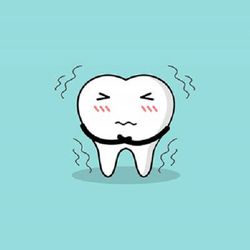
There are few things more frustrating than having to skip your favorite ice cream or morning latte because of the pain it causes your teeth due to sensitivity. It can leave you desperate for answers and a solution that lets you enjoy your favorite hot or cold treats again. The tricky thing with tooth sensitivity is that it can be caused by a number of things.
The strongest substance in the human body is enamel. This enamel is actually what the outermost layer of your teeth is composed of. Under the enamel lies a layer called the dentin. When the enamel is weakened, the dentin, which contains tiny hollow tubes that stimulate the nerves inside the tooth, can cause sensitivity when exposed to temperature extremes.
Tooth Whitening
Many tooth whitening products can cause tooth sensitivity, especially during or right after a treatment. Products that contain hydrogen peroxide are especially likely to cause sensitivity. Over time, too much tooth whitening can lead to damage of the enamel and long-term tooth sensitivity.
Brushing Too Hard
Sometimes, in an effort to really make sure those teeth are squeaky clean, we can actually brush too much and too hard. Over time, it can damage the enamel. If you think you may be prone to brushing too hard, switch to a softer bristled brush. Some electric toothbrushes have sensors to detect how much pressure you apply when brushing, as well.
Acidic Food and Drinks
The diet of most Americans is very acidic, often without even realizing it. Coffee, wine, tomato-based foods, sodas, citrus, just to name a few common highly acidic staples of a typical day. The acid in these foods and drinks wears away at the enamel on the teeth. Brushing right after consumption doesn’t help either, it actually makes it worse as the acid softens the enamel. Rinsing your mouth with water after consuming highly acidic food and drinks is a good option if you can’t avoid them completely.
Faulty Fillings
Old or improperly placed fillings can cause pain or sensitivity when cracks develop around them. Dr. Martin Abelar, DDS, leading San Diego cosmetic and restorative dentist says,
“Investing in quality care when it comes to your dental health not only saves you money in the long run, but it also saves you time and repeated visits for the same problems. Choosing the cheapest option when it comes to something like a filling increases the odds of it being placed incorrectly or with inferior material. This increases the likelihood of developing problems later down the road that require even more work, costing, even more, money, time and potentially pain.”
Gum Disease
A common symptom of gum disease is receding gums which can lead to sensitivity.
Tooth Grinding
Tooth grinding, also called bruxism, often goes unnoticed. Many people grind their teeth in their sleep and may not realize they are doing it. Along with wearing down the enamel on your teeth, causing sensitivity, tooth grinding can also lead to jaw pain and eventually TMJ disorder.
Abelar says,
“There is hope for those that suffer from sensitive teeth. Treatments vary depending on what is causing the sensitivity. A great place to start is with desensitizing toothpaste that bears the ADA seal of acceptance. Professional applications of fluoride gels or other desensitizing agents may be necessary to correct more serious problems. If gum disease is to blame, treatment should be sought immediately to avoid further damage and complications.”
It can be overwhelming trying to sort through all the potential causes of tooth sensitivity. A great place to start seems to be with your family dentist at your bi-annual exam and cleaning. They can help you discover the root cause of your sensitivity and determine what steps you can take to correct it.






